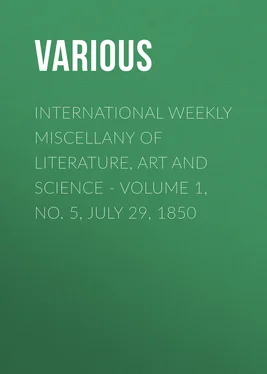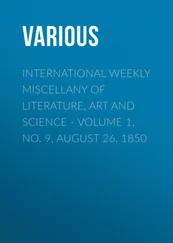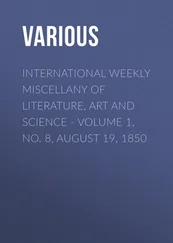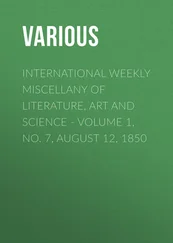Various - International Weekly Miscellany of Literature, Art and Science - Volume 1, No. 5, July 29, 1850
Здесь есть возможность читать онлайн «Various - International Weekly Miscellany of Literature, Art and Science - Volume 1, No. 5, July 29, 1850» — ознакомительный отрывок электронной книги совершенно бесплатно, а после прочтения отрывка купить полную версию. В некоторых случаях можно слушать аудио, скачать через торрент в формате fb2 и присутствует краткое содержание. Жанр: foreign_antique, periodic, foreign_edu, на английском языке. Описание произведения, (предисловие) а так же отзывы посетителей доступны на портале библиотеки ЛибКат.
- Название:International Weekly Miscellany of Literature, Art and Science - Volume 1, No. 5, July 29, 1850
- Автор:
- Жанр:
- Год:неизвестен
- ISBN:нет данных
- Рейтинг книги:5 / 5. Голосов: 1
-
Избранное:Добавить в избранное
- Отзывы:
-
Ваша оценка:
- 100
- 1
- 2
- 3
- 4
- 5
International Weekly Miscellany of Literature, Art and Science - Volume 1, No. 5, July 29, 1850: краткое содержание, описание и аннотация
Предлагаем к чтению аннотацию, описание, краткое содержание или предисловие (зависит от того, что написал сам автор книги «International Weekly Miscellany of Literature, Art and Science - Volume 1, No. 5, July 29, 1850»). Если вы не нашли необходимую информацию о книге — напишите в комментариях, мы постараемся отыскать её.
International Weekly Miscellany of Literature, Art and Science - Volume 1, No. 5, July 29, 1850 — читать онлайн ознакомительный отрывок
Ниже представлен текст книги, разбитый по страницам. Система сохранения места последней прочитанной страницы, позволяет с удобством читать онлайн бесплатно книгу «International Weekly Miscellany of Literature, Art and Science - Volume 1, No. 5, July 29, 1850», без необходимости каждый раз заново искать на чём Вы остановились. Поставьте закладку, и сможете в любой момент перейти на страницу, на которой закончили чтение.
Интервал:
Закладка:
MRS. JORDAN.—Mrs. Jordan was inimitable in exemplifying the consequences of too much restraint in ill-educated country girls, in romps, in hoydens, and in wards on whom the mercenary have designs. She wore a bib and tucker, and pinafore, with a bouncing propriety, fit to make the boldest spectator alarmed at the idea of bringing such a household responsibility on his shoulders. To see her when thus attired, shed blubbering tears for some disappointment, and eat all the while a great thick slice of bread and butter, weeping, and moaning, and munching, and eyeing at very bite the part she meant to bite next, was a lesson against will and appetite worth a hundred sermons, and no one could produce such an impression in favor of amiableness as she did, when she acted in gentle, generous, and confiding character. The way in which she would take a friend by the cheek and kiss her, or make up a quarrel with a lover, or coax a guardian into good humor, or sing (without accompaniment) the song of, "Since then I'm doom'd," or "In the dead of the night," trusting, as she had a right to do, and as the house wished her to do, to the sole effect of her sweet, mellow, and loving voice—the reader will pardon me, but tears of pleasure and regret come into my eyes at the recollection, as if she personified whatsoever was happy at that period of life, and which has gone like herself. The very sound of the familiar word 'bud' from her lips (the abbreviation of husband,) as she packed it closer, as it were, in the utterance, and pouted it up with fondness in the man's face, taking him at the same time by the chin, was a whole concentrated world of the power of loving.
RESIDENCE AT CHELSEA.—REMOTENESS IN NEARNESS.—From the noise and dust of the New Road, my family removed to a corner in Chelsea where the air of the neighboring river was so refreshing, and the quiet of the "no-thoroughfare" so full of repose, that, although our fortunes were at their worst, and my health almost of a piece with them, I felt for some weeks as if I could sit still for ever, embalmed in the silence. I got to like the very cries in the street for making me the more aware of it for the contrast. I fancied they were unlike the cries in other quarters of the suburbs, and that they retained something of the old quaintness and melodiousness which procured them the reputation of having been composed by Purcell and others. Nor is this unlikely, when it is considered how fond those masters were of sporting with their art, and setting the most trivial words to music in their glees and catches. The primitive cries of cowslips, primroses, and hot cross buns, seemed never to have quitted this sequestered region. They were like daisies in a bit of surviving field. There was an old seller of fish in particular, whose cry of "Shrimps as large as prawns," was such a regular, long-drawn, and truly pleasing melody, that in spite of his hoarse, and I am afraid, drunken voice, I used to wish for it of an evening, and hail it when it came. It lasted for some years, then faded, and went out; I suppose, with the poor old weather-beaten fellow's existence. This sense of quiet and repose may have been increased by an early association of Chelsea with something out of the pale; nay, remote. It may seem strange to hear a man who has crossed the Alps talk of one suburb as being remote from another. But the sense of distance is not in space only; it is in difference and discontinuance. A little back-room in a street in London is further removed from the noise, than a front room in a country town. In childhood, the farthest local point which I reached anywhere, provided it was quiet, always seemed to me a sort of end of the world; and I remembered particularly feeling this, the only time when I had previously visited Chelsea, which was at that period of life.... I know not whether the corner I speak of remains as quiet as it was. I am afraid not; for steamboats have carried vicissitude into Chelsea, and Belgravia threatens it with her mighty advent. But to complete my sense of repose and distance, the house was of that old-fashioned sort which I have always loved best, familiar to the eyes of my parents, and associated with childhood. It had seats in the windows, a small third room on the first floor, of which I made a sanctum , into which no perturbation was to enter, except to calm itself with religious and cheerful thoughts (a room thus appropriated in a house appears to me an excellent thing;) and there were a few lime-trees in front, which in their due season diffused a fragrance.
LAMARTINE'S NEW ROMANCE
The great poet of affairs, philosophy, and sentiment, before leaving the scenes of his triumphs and misfortunes for his present visit to the East, confided to the proprietors of Le Constitutionel a new chapter of his romanticized memoirs to be published in the feuilleton of that journal, under the name of "Genevieve." This work, which promises to surpass in attractive interest anything Lamartine has given to the public in many years, will be translated as rapidly as the advanced sheets of it are received here, by Mr. Fayette Robinson, whose thorough apprehension and enjoyment of the nicest delicacies of the French language, and free and manly style of English, qualify him to do the fullest justice to such an author and subject. His version of "Genevieve" will be issued, upon its completion, by the publishers of The International . We give a specimen of its quality in the following characteristic description, of Marseilles, premising that the work is dedicated to "Mlle. Reine-Garde, seamstress, and formerly a servant, at Aix, in Provence."
"Before I commence with the history of Genevieve, this series of stories and dialogues used by country people, it is necessary to define the spirit which animated their composition and to tell why they were written. I must also tell why I dedicate this first story to Mlle. Reine-Garde, seamstress and servant at Aix in Provence. This is the reason.
"I had passed a portion of the summer of 1846 at that Smyrna of France, called Marseilles, that city, the commercial activity of which has become the chief ladder of national enterprise, and the general rendezvous, of those steam caravans of the West, our railroads; a city the Attic taste of which justifies it in assuming to itself all the intellectual cultivation, like the Asiatic Smyrna, inherent in the memory of great poets. I lived outside of the city, the heat of which was too great for an invalid, in one of those villas formerly called bastides , so contrived as to enable the occupants during the calmness of a summer evening—and no people in the world love nature so well—to watch the white sails and look on the motion of the southern breeze. Never did any other people imbibe more of the spirit of poetry than does that of Marseilles. So much does climate do for it.
"The garden of the little villa in which I dwelt opened by a gateway to the sandy shore of the sea. Between it and the water was a long avenue of plane trees, behind the mountain of Notre Dame de la Garde, and almost touching the little lily-bordered stream which surrounded the beautiful park and villa of the Borelli. We heard at our windows every motion of the sea as it tossed on its couch and pillow of sand, and when the garden gate was opened, the sea foam reached almost the wall of the house, and seemed to withdraw so gradually as if to deceive and laugh at any hand which would seek to bedew itself with its moisture. I thus passed hour after hour seated on a huge stone beneath a fig-tree, looking on that mingling of light and motion which we call the Sea . From time to time the sail of a fisherman's boat, or the smoke which hung like drapery above the pipe of a steamer, rose above the chord of the arc which formed the gulf, and afforded a relief to the monotony of the horizon.
Читать дальшеИнтервал:
Закладка:
Похожие книги на «International Weekly Miscellany of Literature, Art and Science - Volume 1, No. 5, July 29, 1850»
Представляем Вашему вниманию похожие книги на «International Weekly Miscellany of Literature, Art and Science - Volume 1, No. 5, July 29, 1850» списком для выбора. Мы отобрали схожую по названию и смыслу литературу в надежде предоставить читателям больше вариантов отыскать новые, интересные, ещё непрочитанные произведения.
Обсуждение, отзывы о книге «International Weekly Miscellany of Literature, Art and Science - Volume 1, No. 5, July 29, 1850» и просто собственные мнения читателей. Оставьте ваши комментарии, напишите, что Вы думаете о произведении, его смысле или главных героях. Укажите что конкретно понравилось, а что нет, и почему Вы так считаете.












